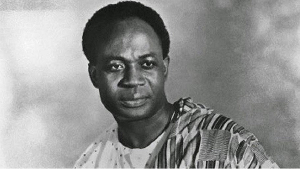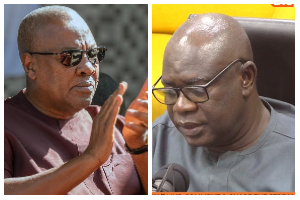Kwame Nkrumah is highly regarded as one of the greatest and most illustrious sons of Africa, and his name has a special place in the hearts of many Africans and people of African descent.
One of the criticisms levelled against him by his critics is that he used too much of Ghana's resources to promote African unity, which was detrimental to national development.
However, it must be pointed out that Nkrumah's vision transcended Ghana and encompassed Africa and the world at large. Kwame rightly believed that Africans have a common destiny and that we either swim together in unity or sink together in disunity.
On the eve of Ghana's independence in 1957, he declared in his famous speech that "The independence of Ghana is meaningless unless it is linked to the total liberation of Africa" in this regard, Accra became the "Mecca" of the African liberation fighters who were given military, financial and diplomatic support by Nkrumah's government.
On the eighth anniversary of Ghana's independence, he said, "As our independence enabled us to assume a greater role in the liberation movement for Africa, so will our industrial and economic strength increase and enhance the development of Africa as a whole."
Kwame's dream of making Ghana a show piece and Africa a continental giant can be grasped in the light of the nation he founded and the continent he toiled relentlessly to unite.
Nkrumah's education policy was aimed at providing equal opportunities for education at all levels to all Ghanaians. He constructed schools in all the regions of Ghana, including technical schools, polytechnics, teacher training colleges, secondary schools, as well as institutes of professional studies. In addition, he established research institutions.
Appreciating the contribution which shipping makes to the development of nations, Nkrumah built a merchant fleet called Black Star Line and established the Ghana Nautical College for the training of Ghana's sea-going personnel. He built the University of Science and Technology and founded the University of Cape Coast to produce graduate teachers.
He provided opportunities for many Africans to study in Ghana and offered scholarships to a lot of them.
He built hospitals in the regional capitals. Polyclinics and health centres were built in all the regions. Osagyefo formed Workers' Brigades and gave them vast farmlands to cultivate using agricultural machines. Many plantations were scattered on the agricultural landscape of Ghana, and agricultural institutions and storage facilities were added to his numerous projects.
Tema, a fishing village, was transformed into an industrial city. The motorway that links Tema to Accra was built by Nkrumah, who embarked on an industrialisation project that gave birth to many industries in Tema and other parts of the country. Kwame initiated the Atomic Energy Project at Kwabenya, which is designed to provide energy for industrial and other uses.
Nkrumah was overthrown in a military couple in 1966, and after his overthrow, many of his projects were abandoned, and some were privatised. There was an order to burn his books and publications, thereby erasing all the traces of the great man. Well, some Ghanaians, including my father, S.M. Arko (RIP) refused to burn their collection of Nkrumah's books. His statues were demolished, but "Nkrumah never dies."
The deposed president lived in exile in Guinea Conakry, where he was made co-president by Sekou Toure. When he died in Romania, his body was interred in Guinea after heads of State carried his casket as a show of respect and admiration of the great statesman.
After relentless efforts by the then government of Ghana led by the late General Acheampong, Nkrumah's body was flown into Accra, where he was laid in state and laid to rest at Nkroful his hometown.
His body has been finally entombed in the memorial park located at the Old Polo Ground, where his independence speech was delivered in 1957.
An imposing statue of Osagyefo adorns the park, which is a glowing tribute to the great statesman whose ideas and vision have stood the test of time.
"As far as I am concerned, death can no extinguish the flame that I have lit in Africa. Long after I am gone, the torch that I have lit will continue to burn to give hope and encouragement to many" Nkrumah 1962.
Opinions of Sunday, 22 September 2024
Columnist: George Kwame Arko















